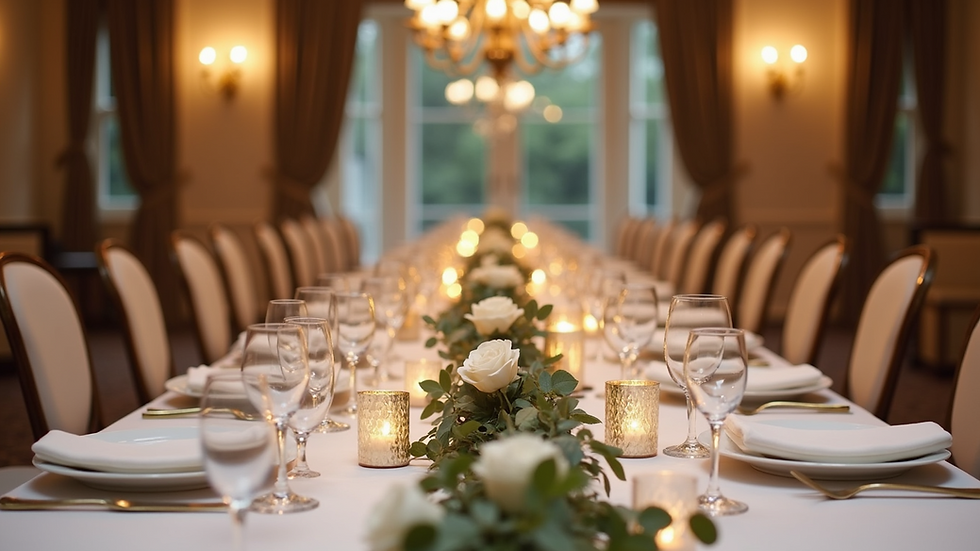Cultural Traditions: Celebrating Our Unique Heritage
- Ngata Holele
- Sep 8, 2025
- 4 min read
Cultural traditions are the threads that weave the fabric of our societies. They connect us to our past, shape our identities, and guide our future. From vibrant festivals to unique culinary practices, these traditions reflect the values and beliefs of communities around the world. In this blog post, we will explore the significance of cultural traditions, highlight some fascinating examples, and discuss how we can celebrate and preserve our unique heritage.
The Importance of Cultural Traditions
Cultural traditions play a vital role in our lives. They help us understand who we are and where we come from. Traditions can be seen in various forms, including:
Festivals: Celebrations that bring communities together.
Rituals: Practices that mark important life events.
Cuisine: Unique dishes that tell stories of history and culture.
These elements not only enrich our lives but also foster a sense of belonging. They remind us of our roots and the shared experiences that unite us.
Festivals Around the World
Festivals are a vibrant expression of cultural traditions. They often involve music, dance, food, and community gatherings. Here are a few notable examples:
Diwali
Diwali, also known as the Festival of Lights, is celebrated by millions of people around the world, particularly in India. This festival symbolizes the victory of light over darkness and good over evil. Families decorate their homes with oil lamps, exchange gifts, and enjoy festive meals together.
Carnival
Carnival is a lively festival celebrated in many countries, including Brazil and Trinidad and Tobago. It features colorful parades, elaborate costumes, and energetic music. Carnival is a time for people to come together, celebrate life, and express their creativity.
Chinese New Year
Chinese New Year is one of the most important festivals in Chinese culture. It marks the beginning of the lunar new year and is celebrated with family reunions, feasts, and fireworks. Each year is associated with a specific animal from the Chinese zodiac, adding a unique twist to the celebrations.
Unique Culinary Traditions
Food is a significant aspect of cultural traditions. It not only nourishes us but also tells stories of history and heritage. Here are some unique culinary traditions from around the world:
Italian Pasta Making
In Italy, pasta making is an art form passed down through generations. Families often gather to make fresh pasta from scratch, using simple ingredients like flour and eggs. This tradition not only creates delicious meals but also strengthens family bonds.
Mexican Day of the Dead Cuisine
During the Day of the Dead, families in Mexico prepare special dishes to honor their deceased loved ones. Traditional foods like pan de muerto (bread of the dead) and sugar skulls are made and shared among family members. This culinary tradition is a beautiful way to celebrate life and remember those who have passed.
Japanese Tea Ceremony
The Japanese tea ceremony is a ritualistic practice that emphasizes harmony, respect, purity, and tranquility. It involves the preparation and serving of matcha (powdered green tea) in a serene setting. This tradition reflects the deep appreciation for nature and the importance of mindfulness.
Preserving Cultural Traditions
As the world becomes more interconnected, it is essential to preserve our cultural traditions. Here are some ways we can do this:
Education: Teach younger generations about their cultural heritage through storytelling and hands-on activities.
Community Events: Organize local festivals and events that celebrate cultural diversity and encourage participation from all community members.
Support Local Artisans: Buy handmade crafts and products from local artisans to keep traditional skills alive.
The Role of Technology in Cultural Preservation
Technology can play a significant role in preserving cultural traditions. Here are some ways it can help:
Digital Archives: Creating online archives of cultural practices, stories, and artifacts can ensure that they are accessible to future generations.
Social Media: Platforms like Instagram and Facebook allow people to share their cultural traditions with a global audience, fostering appreciation and understanding.
Virtual Events: Online festivals and workshops can connect people from different backgrounds, allowing them to experience and learn about various cultural traditions.
Celebrating Diversity
Cultural traditions are a celebration of diversity. They remind us that our differences make us unique and enrich our lives. By embracing and respecting various traditions, we can create a more inclusive and harmonious world.
Engaging with Cultural Traditions
Participating in cultural traditions can be a rewarding experience. Here are some ways to engage:
Attend Local Festivals: Explore festivals in your area to experience different cultures firsthand.
Try New Recipes: Experiment with cooking traditional dishes from various cultures to broaden your culinary skills.
Learn a Traditional Craft: Take a class to learn a traditional craft, such as pottery or weaving, to connect with the history behind it.
The Future of Cultural Traditions
As we move forward, it is crucial to keep cultural traditions alive. They are not just relics of the past but living practices that evolve with time. By actively participating in and promoting these traditions, we can ensure they continue to thrive.
A Tapestry of Heritage
Cultural traditions are a beautiful tapestry of our heritage. They connect us to our ancestors and provide a sense of identity. By celebrating and preserving these traditions, we honor our past while enriching our present and future. Let us embrace our unique heritage and share it with the world.

In a world that often feels divided, cultural traditions remind us of our shared humanity. They invite us to celebrate our differences and find common ground. So, let us come together, learn from one another, and cherish the rich tapestry of cultural traditions that make our world a vibrant place to live.


Comments